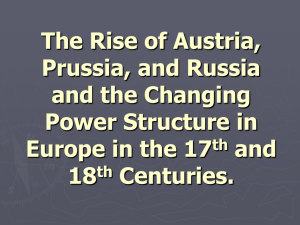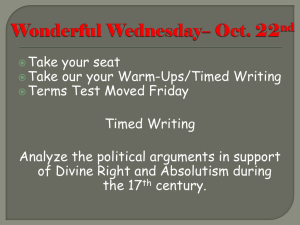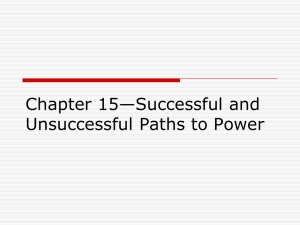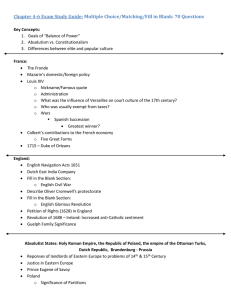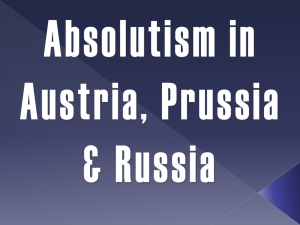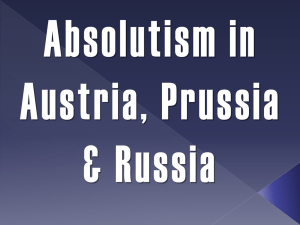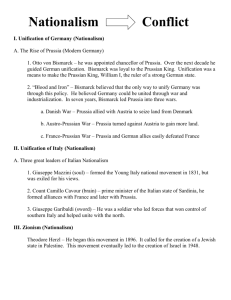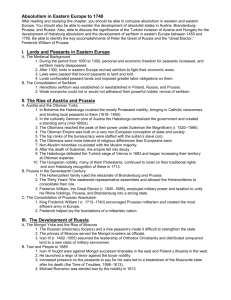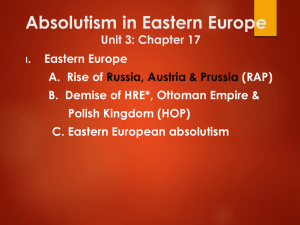Chapter 17 Review Quiz
advertisement
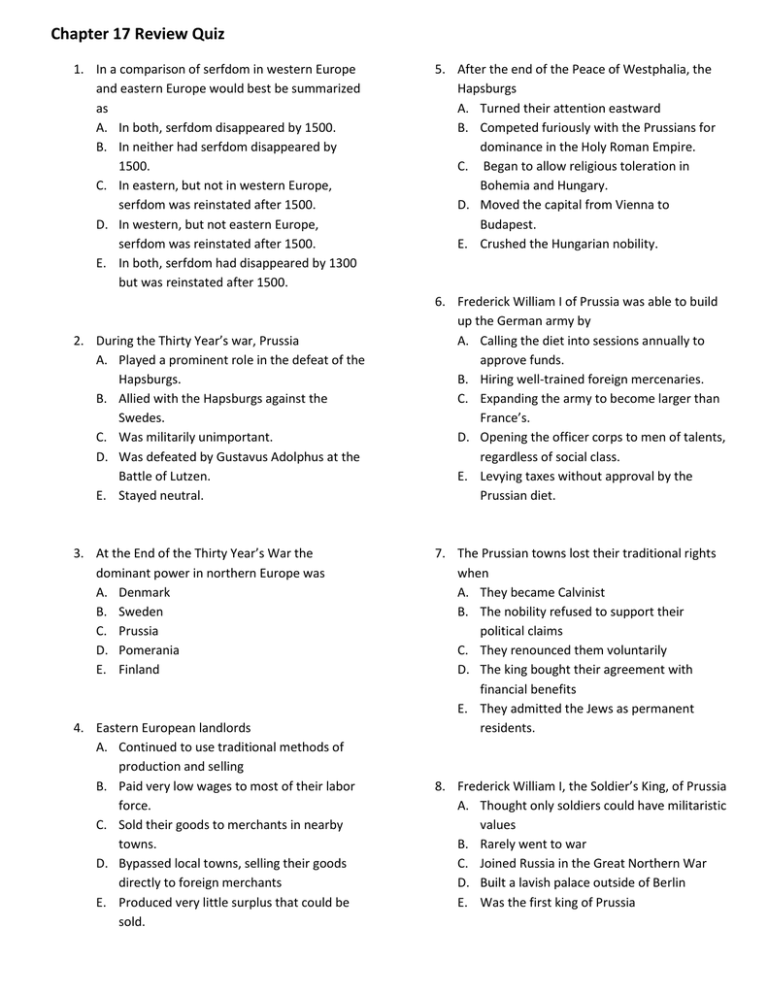
Chapter 17 Review Quiz 1. In a comparison of serfdom in western Europe and eastern Europe would best be summarized as A. In both, serfdom disappeared by 1500. B. In neither had serfdom disappeared by 1500. C. In eastern, but not in western Europe, serfdom was reinstated after 1500. D. In western, but not eastern Europe, serfdom was reinstated after 1500. E. In both, serfdom had disappeared by 1300 but was reinstated after 1500. 2. During the Thirty Year’s war, Prussia A. Played a prominent role in the defeat of the Hapsburgs. B. Allied with the Hapsburgs against the Swedes. C. Was militarily unimportant. D. Was defeated by Gustavus Adolphus at the Battle of Lutzen. E. Stayed neutral. 3. At the End of the Thirty Year’s War the dominant power in northern Europe was A. Denmark B. Sweden C. Prussia D. Pomerania E. Finland 4. Eastern European landlords A. Continued to use traditional methods of production and selling B. Paid very low wages to most of their labor force. C. Sold their goods to merchants in nearby towns. D. Bypassed local towns, selling their goods directly to foreign merchants E. Produced very little surplus that could be sold. 5. After the end of the Peace of Westphalia, the Hapsburgs A. Turned their attention eastward B. Competed furiously with the Prussians for dominance in the Holy Roman Empire. C. Began to allow religious toleration in Bohemia and Hungary. D. Moved the capital from Vienna to Budapest. E. Crushed the Hungarian nobility. 6. Frederick William I of Prussia was able to build up the German army by A. Calling the diet into sessions annually to approve funds. B. Hiring well-trained foreign mercenaries. C. Expanding the army to become larger than France’s. D. Opening the officer corps to men of talents, regardless of social class. E. Levying taxes without approval by the Prussian diet. 7. The Prussian towns lost their traditional rights when A. They became Calvinist B. The nobility refused to support their political claims C. They renounced them voluntarily D. The king bought their agreement with financial benefits E. They admitted the Jews as permanent residents. 8. Frederick William I, the Soldier’s King, of Prussia A. Thought only soldiers could have militaristic values B. Rarely went to war C. Joined Russia in the Great Northern War D. Built a lavish palace outside of Berlin E. Was the first king of Prussia 9. The princes of Moscow were able to make it the central state of Russia A. After having been the servants of the Mongols. B. Because they had refused for two centuries to serve the Mongols. C. After Ivan the Terrible killed off his opponents. D. Because they were blessed by the patriarch of Kiev. E. After its princes moved there from St. Petersburg. 10. Peter the Great’s main motive for westernizing Russia was A. Political B. Economic C. Military D. Cultural E. Architectural 11. Which battle is correctly matched? A. Poltava- Peter the Great defeated the Swedes. B. White Mountain- Austria defeated the Ottoman Empire and got Hungary. C. Mohacs- The Hapsburgs defeated Bohemia D. Narva –Ivan the Terrible defeated the Mongols. E. Vienna- The Ottomans defeated the Hapsburgs. 12. The discontent of Russian peasants under the tsars A. Rarely expressed itself in riots or uprisings B. Increased because of rising expectations C. Broke out in a revolt led by Stenka Razin. D. Usually was expressed by organized protests in the capital. E. Brought them into alliance with urban workers. 13. The slave corps, the janissaries, in the Ottoman Empire A. Were horribly treated because they were Christian. B. Rose to important positions as administrators and palace guards. C. Mostly came from Anatolia (now Turkey). D. Were employed as eunuchs in the harems. E. Were not allowed to convert to Islam 14. Which did the Prussian state not share with the Ottoman, Russian, and Austrian Empires? A. Absolute monarchs B. Repressed peasantry C. Territorial integrity D. Territorially expansionist regimes E. Great capital cities 15. The Pragmatic Sanction was designed to A. Allow a Spanish Hapsburg to assume the throne in Austria when Charles VI died without an heir B. Kept the Hapsburg empire together C. Prevent a woman from inheriting the throne D. Prevent a Hohenzollern from becoming Holy Roman Emperor. E. Keep a Bourbon off the Spanish throne.
